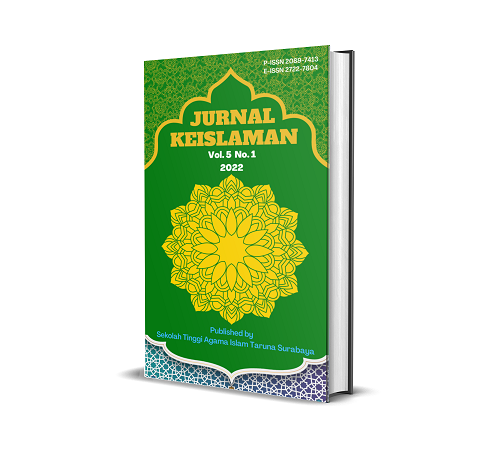JANJI (WA’AD) SEBAGAI JARING PENGAMAN PADA TRANSAKSI KEUANGAN DAN BISNIS SYARIAH
Abstract
Islam mempunyai sistem yang adil dalam mengatur aktivitas perekonomian. Wa’ad atau janji merupakan praktek yang lazim digunakan pada transaksi. MUI melalui mengeluarkan fatwa untuk melindungi praktek wa’ad secara islam. Studi ini bertujuan untuk mengobservasi apakah fatwa MUI mengenai wa’ad benar benar bertujuan positif bagi transaksi secara syariat. Studi ini menggunakan metode kualitatif dengan studi kepustakaan dalam mengumpulkan data. Studi ini merupakan review dari penetapan fatwa MUI tentang salah satu hukum islam yang digunakan pada akad jual beli. Hasil studi menunjukkan bahwa akad wa’ad seperti transaksi produk makanan harus diawasi oleh pihak berwenang seperti BPPOM. Hal ini untuk menghindari kerugian bagi pihak konsumen perihal penyalahgunaan akad wa’ad, seperti janji bahwa produk yang dijual adalah halal atau tidak kadaluarsa. Selain itu, wa’ad dalam tarnsaksi keuangan juga harus disertai dengan perjanjian tertulis sebagai pengaman. Wa’ad pada keuangan syariah memang belum mempunyai ketetapan hukum yang jelas, baik pada undang undang, maupun pada Al qur’an. Oleh karena itu sudah tepat bila DSN MUI mengeluarkan fatwa terkait dengan Wa’ad.References
Agus, Panji Adam. “Konsep Wa’ad Dan Implementasinya Dalam Fatwa Dewan Syariah Nasional-Majelis Ulama Indonesia.†Amwaluna: Jurnal Ekonomi Dan Keuangan Syariah 2, no. 2 (2018): 222–37.
Atan, Rodziah, and Nur Adila Azram. “A Framework for Halal Knowledge Metadata Representations.†In Applied Mechanics and Materials, 892:8–15. Trans Tech Publ, 2019.
Barata, Amrin. “STRENGTHENING NATIONAL ECONOMIC GROWTH AND EQUITABLE INCOME THROUGH SHARIA DIGITAL ECONOMY IN INDONESIA.†Journal of Islamic Monetary Economics and Finance 5, no. 1 (2019): 145–68.
Boubaker, Sabri, Riadh Manita, and Salma Mefteh-Wali. “Foreign Currency Hedging and Firm Productive Efficiency.†Annals of Operations Research, 2020, 1–22.
Boudoukh, Jacob, Matthew Richardson, Ashwin Thapar, and Franklin Wang. “Optimal Currency Hedging for International Equity Portfolios.†Financial Analysts Journal 75, no. 4 (2019): 65–83.
Ibrahim, Mansor H, and Nafis Alam. “Islamic Economics and Islamic Finance in the World Economy.†The World Economy 41, no. 3 (2018): 668–73.
Idwar, Agung Permana. “IMPLEMENTASI WA’AD SEBAGAI INSTRUMEN PERIKATAN PRODUK PEMBIAYAAN PADA PT. BPRS AL-MAKMUR,†2019.
Islam, Serajul, and Tania Sultana. “Practice of Islamic Financial Management in Bangladesh: Evidence from Islamic Banks.†International Journal of Islamic Banking and Finance Research 3, no. 1 (2019): 1–12.
Khan, Foyasal. “Waqf: An Islamic Instrument of Poverty Alleviation-Bangladesh Perspective.†In International Conference-The Tawhidi Espitomology: Zakat and Waqf Economy. Bangi, 65–96, 2001.
Krisharyanto, Edi, Endang Retnowati, and Noor Tri Hastuti. “Regulation and Provisions for Supervision of Halal Products in Indonesia.†Journal of Legal, Ethical and Regulatory Issues 22, no. 1 (2019): 1–10.
Luhur, Mujhid Budi. “Analisis Hukum Wa’ad IMBT (Ijarah Muntahiyah Bittamlik) Dalam Fatwa DSN MUI (Dewan Syari’ah Nasional–Majelis Ulama’Indonesia) Berdasarkan Kaidah Fiqhiyyah Irtikaabu Akhaffi Al-Dhararain.†Fakultas Syariah dan Hukum Universitas Islam Negeri Syarif Hidayatullah Jakarta, n.d.
Maulidizen, Ahmad. “Ibn Khaldun’s Economic Thought; The Fair Tax And Its Relevance To The Modern Economy.†International Journal of Islamic Business and Economics (IJIBEC) 3, no. 2 (2019): 73–89.
Mohamad, Muhammad Hisyam. “Promise (wa’ad) and Contract ('aqad) according to Islamic Law: A Comparative Study.†Online Journal of Research in Islamic Studies 1, no. 1 (2017): 63–85.
Mohammad, Mustafa Omar, and Syahidawati Shahwan. “The Objective of Islamic Economic and Islamic Banking in Light of Maqasid Al-Shariah: A Critical Review.†Middle-East Journal of Scientific Research 13, no. 13 (2013): 75–84.
Muslimin, J M. “Society, Law and Economy: Contextualizing Ibn Khaldun’s Thought.†Al-Iqtishad: Jurnal Ilmu Ekonomi Syariah (Journal of Islamic Economics) 11 (2019): 167–80.
Muthoharoh, Anifatul. “Implementasi Wa’ad Dalam Akad Ijarah Muntahiyah Bi Al-Tamlik Perspektif Fatwa Dewan Syariah Nasional Majelis Ulama Indonesia NO. 85/DSN-MUI/XII/2012: Studi Di Bank Jatim Syariah Kantor Cabang Sidoarjo.†Universitas Islam Negeri Maulana Malik Ibrahim, 2017.
Nienhaus, Volker. “Fundamentals of an Islamic Economic System Compared to the Social Market Economy.†KAS International Reports 77 (2010).
Nor, Amirudin Mohd, Siti Nurulhuda Ibrahim, and Shahreena Daud. “Recovery Issues on Murabahah Financing in Malaysia.†International Journal of Academic Research in Business and Social Science 10, no. 4 (2020): 295–308.
Opie, Wei, and Steven J Riddiough. “Global Currency Hedging with Common Risk Factors.†Journal of Financial Economics 136, no. 3 (2020): 780–805.
Rattani, Abbas, and Adnan A Hyder. “Developing an Islamic Research Ethics Framework.†Journal of Religion and Health 58, no. 1 (2019): 74–86.
Winarni, Leni, Dafri Agussalim, and Zainal Abidin Bagir. “Religio-Politics of Islamic Group in the Contestation of 2019 Indonesian Presidential Election.†Politik Indonesia: Indonesian Political Science Review 5, no. 1 (2020).
Yazid, Fadhil, Tan Kamello, Yasir Nasution, and Edy Ikhsan. “Strengthening Sharia Economy Through Halal Industry Development in Indonesia.†In International Conference on Law, Governance and Islamic Society (ICOLGIS 2019), 86–89. Atlantis Press, 2020.
Copyright (c) 2022 Akhmad Kusuma Wardhana

This work is licensed under a Creative Commons Attribution-ShareAlike 4.0 International License.
Authors who publish with this journal agree to the following terms:
- Authors retain copyright and grant the journal right of first publication with the work simultaneously licensed under a Creative Commons Attribution-ShareAlike that allows others to share the work with an acknowledgement of the work's authorship and initial publication in this journal.
- Authors are able to enter into separate, additional contractual arrangements for the non-exclusive distribution of the journal's published version of the work (e.g., post it to an institutional repository or publish it in a book), with an acknowledgement of its initial publication in this journal.
- Authors are permitted and encouraged to post their work online (e.g., in institutional repositories or on their website) prior to and during the submission process, as it can lead to productive exchanges, as well as earlier and greater citation of published work (See The Effect of Open Access).






















